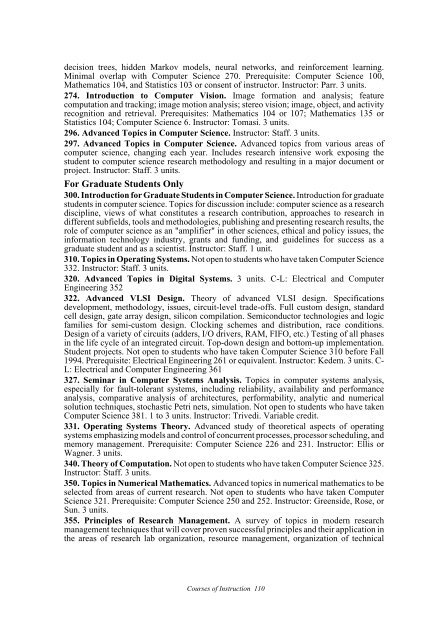Duke University 2008-2009 - Office of the Registrar - Duke University
Duke University 2008-2009 - Office of the Registrar - Duke University
Duke University 2008-2009 - Office of the Registrar - Duke University
Create successful ePaper yourself
Turn your PDF publications into a flip-book with our unique Google optimized e-Paper software.
decision trees, hidden Markov models, neural networks, and reinforcement learning.<br />
Minimal overlap with Computer Science 270. Prerequisite: Computer Science 100,<br />
Ma<strong>the</strong>matics 104, and Statistics 103 or consent <strong>of</strong> instructor. Instructor: Parr. 3 units.<br />
274. Introduction to Computer Vision. Image formation and analysis; feature<br />
computation and tracking; image motion analysis; stereo vision; image, object, and activity<br />
recognition and retrieval. Prerequisites: Ma<strong>the</strong>matics 104 or 107; Ma<strong>the</strong>matics 135 or<br />
Statistics 104; Computer Science 6. Instructor: Tomasi. 3 units.<br />
296. Advanced Topics in Computer Science. Instructor: Staff. 3 units.<br />
297. Advanced Topics in Computer Science. Advanced topics from various areas <strong>of</strong><br />
computer science, changing each year. Includes research intensive work exposing <strong>the</strong><br />
student to computer science research methodology and resulting in a major document or<br />
project. Instructor: Staff. 3 units.<br />
For Graduate Students Only<br />
300. Introduction for Graduate Students in Computer Science. Introduction for graduate<br />
students in computer science. Topics for discussion include: computer science as a research<br />
discipline, views <strong>of</strong> what constitutes a research contribution, approaches to research in<br />
different subfields, tools and methodologies, publishing and presenting research results, <strong>the</strong><br />
role <strong>of</strong> computer science as an "amplifier" in o<strong>the</strong>r sciences, ethical and policy issues, <strong>the</strong><br />
information technology industry, grants and funding, and guidelines for success as a<br />
graduate student and as a scientist. Instructor: Staff. 1 unit.<br />
310. Topics in Operating Systems. Not open to students who have taken Computer Science<br />
332. Instructor: Staff. 3 units.<br />
320. Advanced Topics in Digital Systems. 3 units. C-L: Electrical and Computer<br />
Engineering 352<br />
322. Advanced VLSI Design. Theory <strong>of</strong> advanced VLSI design. Specifications<br />
development, methodology, issues, circuit-level trade-<strong>of</strong>fs. Full custom design, standard<br />
cell design, gate array design, silicon compilation. Semiconductor technologies and logic<br />
families for semi-custom design. Clocking schemes and distribution, race conditions.<br />
Design <strong>of</strong> a variety <strong>of</strong> circuits (adders, I/O drivers, RAM, FIFO, etc.) Testing <strong>of</strong> all phases<br />
in <strong>the</strong> life cycle <strong>of</strong> an integrated circuit. Top-down design and bottom-up implementation.<br />
Student projects. Not open to students who have taken Computer Science 310 before Fall<br />
1994. Prerequisite: Electrical Engineering 261 or equivalent. Instructor: Kedem. 3 units. C-<br />
L: Electrical and Computer Engineering 361<br />
327. Seminar in Computer Systems Analysis. Topics in computer systems analysis,<br />
especially for fault-tolerant systems, including reliability, availability and performance<br />
analysis, comparative analysis <strong>of</strong> architectures, performability, analytic and numerical<br />
solution techniques, stochastic Petri nets, simulation. Not open to students who have taken<br />
Computer Science 381. 1 to 3 units. Instructor: Trivedi. Variable credit.<br />
331. Operating Systems Theory. Advanced study <strong>of</strong> <strong>the</strong>oretical aspects <strong>of</strong> operating<br />
systems emphasizing models and control <strong>of</strong> concurrent processes, processor scheduling, and<br />
memory management. Prerequisite: Computer Science 226 and 231. Instructor: Ellis or<br />
Wagner. 3 units.<br />
340. Theory <strong>of</strong> Computation. Not open to students who have taken Computer Science 325.<br />
Instructor: Staff. 3 units.<br />
350. Topics in Numerical Ma<strong>the</strong>matics. Advanced topics in numerical ma<strong>the</strong>matics to be<br />
selected from areas <strong>of</strong> current research. Not open to students who have taken Computer<br />
Science 321. Prerequisite: Computer Science 250 and 252. Instructor: Greenside, Rose, or<br />
Sun. 3 units.<br />
355. Principles <strong>of</strong> Research Management. A survey <strong>of</strong> topics in modern research<br />
management techniques that will cover proven successful principles and <strong>the</strong>ir application in<br />
<strong>the</strong> areas <strong>of</strong> research lab organization, resource management, organization <strong>of</strong> technical<br />
Courses <strong>of</strong> Instruction 110









